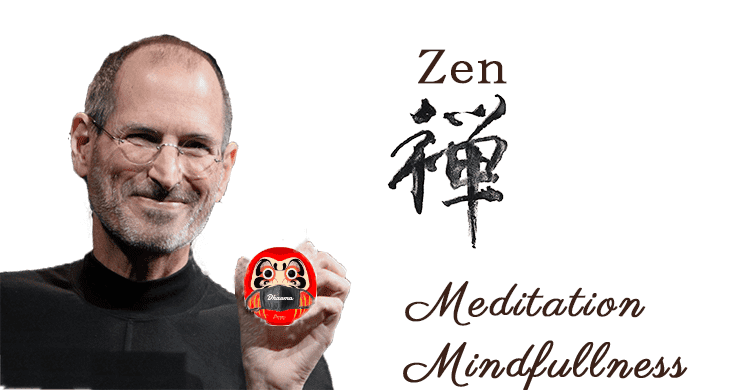Hello everyone how are you doing? Today’s theme is “Zen” or “Zen meditation” that is one of “Cool Japan” and “Mindfulness” that has become popular in USA, Europe and other areas around the world, and which is one of the origine from “Zen”.
Speaking of the Mindfulness meditation, this is well-known fact that is a staple of employee development in several Fortune 500 organizations including General Mills, Goldman Sachs, Google, Apple, and Nike.
Contents
Steve Jobs loved “ZEN”
The word “ZEN” or “Zen meditation” is one of the most noted Japanese word around the world right now.
I think one of the reasons is that the late Steve Jobs, who was a co-founder of Apple Inc. which is one of the big TEC technology companies.
And he had the greatest influence globally in the 21st century, loved ZEN.
It is often said that the roots of the simplicity of the iPhone come from ZEN.
In other words, Jobs’s design aesthetic was influenced by philosophies of Zen and Buddhism.
In India, he experienced Buddhism while on his seven-month spiritual journey, and his sense of intuition was influenced by the spiritual people with whom he studied.
As a result of Jobs’s brilliant achievements, many companies in Silicon Valley, such as Google, now have a training menu that incorporates Zen elements.
What’s Zen ?
Zen Buddihism began almost 2,500 years ago when Buddha achieved enlightenment through Zen meditation in India.
The current Chinese character for Zen(禅)is pronounced “chan” in Chinese and “zen” in Japanese, and both are used in Europe and America.
According to Zen Buddhism, Bodhi Daruma, a Buddhist monk who lived during the 5th or 6th century came from India to China and introduced Zen.
Zen came to Japan, from China, during the Kamakura period (1185 – 1333), the time of samurai.
The Kamakura period started in the 11th century and ended in the middle of the 14th century.
Samurai practiced Zen to keep their mind calm and clear when they fought in war.
Regarding Dharma, there is a proverb that “Seven falls and eight wakes up” has a real model of the monk, Dharma.
This adage implies “not giving up, keeping at it until one succeeds”; “the vicissitudes of life”, and “ups, downs in life”.
These sayings come from the fact that aged Dharma came to China through the Silk Road challenging the tough difficulties facing many failures.
Have you ever seen such a figurine or lucky charm shown below at a souvenir shop when you went to a tourist spot? Or, if you go, you will see most of them.
It’s a familiar item used to pray for the good luck of the year by drawing the eyes or praying for the victory of elections, examinations for schools or qualifications, and so on.
It was Eisai that introduced Zen Buddhism from China to Japan for the first time and opened Rinzai Sect..
It is said that he also brought tea at that time.
After returning to Japan, Eisai opened Kenninji in Kyoto and Jufukuji in Kamakura and spread the Rinzai sect.
In the meantime, Dogen who opened Soto Sect.
He also travels to China to work on training and gain enlightenment.
After returning to Japan, Dogen left the capital of Kyoto, he built Eihei-ji Temple in Fukui Prefecture, which is a quiet place, and started training with zazen as the first priority.
After that, various aspects of Japanese culture – such as, Noh theater, the tea ceremony, Japanese gardening, and even some foods called kaiseki ryouri were influenced by Zen.
Therefore, you can see that today,Japan’s culture has its roots in Zen.
Zen was born in India, grown in China, and blossomed in Japan, afterwards spreading across the world.
For example, in the world of business, Steve Jobs and Google have been influenced by Zen, as have Phil Jackson in the NBA, Ichiro Suzuki in majar league baseball.
Zen is about finding yourself (finding out who you really are), as well as finding truth – not worshipping others, but believing in yourself, knowing “who you really are,” being yourself, living in your own way.
These are the goals of Zen.
In order to live the way we want, we practice Zen. By practicing Zazen and learning the words of Zen, you can take your life into your own hands in a stress-free way.
What’s Zazen?
Zazen means Zen meditation, usually conducted in the lotus position as below
When we practice Zazen, we remember these words: “Maintain posture, control breath, keep the mind calm.”
First of all we have to prepare our bodies by adjusting our posture, and then our breathing.
When we have the correct posture and breathing, then we correct our mind.
These three things are important in Zazen meditation.
What’s the difference between Zen and Mindfulness?
In a familiar example, running is easy to understand. The other day, about 40 students in the MBA (Master of Business Administration) course at Columbia University graduate school in New York came to study Zen such as zazen and meditation.
We asked these questions to explain to them what’s the difference between Zen and mindfulness.
“Do you have a daily routine to run in Central Park?” asked, “What are you doing for all?” some said, “we want to lose weight,” “we want to refresh,” “we want to build a strong body,” and so on.
That’s exactly how mindfulness is used in the West. In other words, they run because they have some benefit.
However, Zen doesn’t think of such things. Run to run. Certainly, if you’re running, you’ll lose weight and your body will be stronger.
But Zen doesn’t do that. It just means that when we were running, it was natural. In order to get things done, it must be the goal of practicing, not short-term profits in front of them.
Buddhism does not believe in any god. We believe that the person named Buddha gained enlightenment.
However, the content of the enlightenment is unknown. No one knows what kind of situation he reached.
Therefore, it is the motive of Buddhist practitioners to know what it is. We don’t know what lies ahead.
But believing that something is happening, practitioners suffer just like Buddha. That is the essence of Buddhism and Zen.
In other words, Zen does not aim, if at all, as a result of training to reduce anxiety levels and to become healthy.
Focus on the more transcendental question, what is the content of Buddha.
And even if you can realize it, Zen thinks that it should not end up satisfying.
The important thing is to use that experience for the sake of the world once enlightened.
Zen training is just the means.
In that sense, the mindset is fundamentally different from mindfulness, which is aimed at improving one’s concentration and feeling of happiness.
Another point I think is whether, in a sense, the feeling of happiness obtained from a utilitarian way of thinking is long-lasting.
Certainly, if you measure the activity of the brain as an experiment, it may be scientifically said that you are in a “happy state” at that time.
But if it’s short-term and not firmly rooted in your mind, it’s not a fundamental solution.
Humans are greedy. Even if you feel happy at that time, if you get a certain sense of accomplishment, you will not be satisfied with it.
Then, after that, we don’t know if we can get the same feeling of happiness by doing the same thing.
The more you try to be mindful, the more you become obsessed with yourself and often the opposite.
However, meditation is not a separate Zen privilege. Meditation is done in Shingon Buddhism, Islam, and Christianity.
Also, Buddhism is a religion that has a high affinity with science.
His Majesty the Dalai Lama also says that religion and science do not contradict each other, and is actively trying to incorporate scientific knowledge into Buddhism.
However, even in the same meditation, the purpose and its essential idea can be completely different.
Conversely, if you compare mindfulness and Zen and let them know the difference, you will be able to understand more clearly what Zen is and what it is.
Finally, we have “mindfulness ” to be well-worth visiting, thanks

















